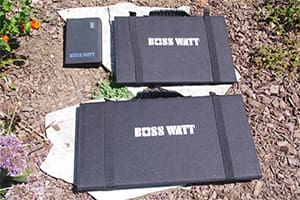Long jaunts ashore drain personal electronics of battery power, potentially leaving us without the use of a cellphone, portable GPS, hand-held VHF radio and other personal electronics. The obvious solution to this is a ready source of external renewable power in a small package.
Cellphones draw very little current so many of us already carry pocket chargers, which range in price from roughly $10 to $25. They are cheap, they are easy to charge with a 12-volt DC cigarette lighter port, and they fit in your pocket. And the technology is simple: a pair of rechargeable nickel cadmium AA batteries with a USB port in an attractive package. However, for larger electrical devices such as a laptop computer or an electric razor, or for simultaneous charging of several USB-capable devices, we need a beefier charging unit with far more power.
Boss Watt of Bakersfield, Calif., offers just the kind of portable charging capacity many of us need while voyaging and making long visits ashore. Boss Watt is a small start-up company dedicated solely to innovating solar charging solutions for off-grid adventurers.
Scott Leonard, president and chief designer for Boss Watt, has designed a micro solar generator capable of supplying 100 watts of 12-volt power with a capacity of 88 Watt-hours. The unit, compressed into a 5-by-7.5-by-1-inch water-resistant, rubber-coated package, offers charging power via three USB ports and a standard three-prong 110-VAC outlet. A powerful LED light ensures you will be able to operate the unit on a moonless night ashore.
The Boss Watt charger draws its power from a folding solar panel array available in two sizes: 120 watts from a panel measuring 20.5 by 56 inches (11 by 20.5 inches folded) and 25 watts from a 16-by-33-inch (11 by 16 inches folded) panel, the smaller of which easily fits in a backpack. The panels and charging unit are sold separately.
“The charger is small and light,” explained Leonard, “so you can carry it in your backpack all day and charge it wherever you are with its own compact solar panel array.” For a price “well under $400,” said Leonard, this is a hard bargain to beat.
To be sure, charging units with multiple USB ports abound in sporting goods shops, but most lack the holy grail of portable charging: 110-volt AC current.
For example, Nekteck’s 21-watt folding solar panel is backpack ready at 6.3 by 11.1 inches by 1 inch — the size of a book. It has two USB ports and includes a micro-USB cable. At about $60 you have all the power you require for small hand-held electronics while on shore for your island forays.
The Suaoki 100-watt 12/18-volt charger with folding solar panel fills the middle ground between the Boss Watt 110-VAC charger and the smaller USB-only units, such as the Nekteck. Instead of using a three-prong AC port, the Suaoki provides a two-prong AC port and a bundle of adapters, allowing the user to charge a laptop computer or other small 110-VAC device. The complete Suaoki kit is in the same price range as the Boss Watt charger but lacks the three-prong plug required by some portable electronic devices.
Other innovative devices are sure to fill the gaps in the cruiser’s power charging arsenal in the future. Find the device offering the most versatility in the smallest package, and enjoy your long hikes ashore.
Circumnavigator-author Bill Morris is the author of Sun, Wind, & Water: The Essential Guide to the Energy-Efficient Cruising Boat and is a frequent contributor to Ocean Navigator.

